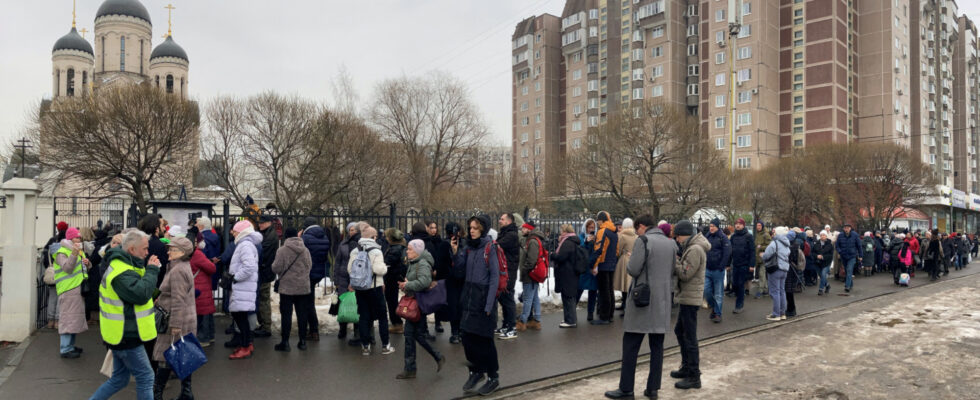Thousands of supporters of Russian opponent Alexeï Navalny gathered on Friday to pay tribute to him in front of a Moscow church before his funeral, despite the risk of arrests by the police. Kremlin spokesperson Dmitri Peskov thus avoided potential sanctions in the event of participation in any “unauthorized” demonstration during the funeral. According to AFP journalists on site, a long queue, under close police surveillance, has formed since the morning in front of the church where the ceremony is to take place.
This crowd gathered near the Moscow cemetery chanted “No to war!” in protest against the Russian invasion, launched more than two years ago against Ukraine. “He was not afraid and we are not afraid!”, “We will not forgive!”, launched the sympathizers of Alexeï Navalny. “It’s painful, people like him should not die, honest people, with principles, ready to sacrifice themselves,” says Anna Stepanova, also emphasizing the opponent’s “sense of humor.” “Even in pain, he made jokes.”
Main critic of the Kremlin and charismatic anti-corruption activist, Alexeï Navalny died on February 16 at the age of 47 in a Russian penal colony in the Arctic in circumstances which remain obscure. His collaborators, his widow Yulia Navalnaïa and the West have accused Vladimir Putin of being responsible for his death, which the Kremlin does not have. 45 people were arrested during the rallies, according to the specialized NGO OVD-Info, most of which took place in cities other than the capital.
After delaying handing over the remains of Alexei Navalny to his loved ones, the Russian authorities finally did so last weekend, allowing a funeral. An ally of the opponent, Ivan Zhdanov, indicated in the middle of the day that the hearse with the body of the opponent was about to leave to go to church. The funeral service is due to begin at 2 p.m. in a church in the Marino district, in the southeast of the Russian capital, where the opponent lived when he was free. Several dozen members of the police were deployed in the area. The authorities also marked off the path leading from the church to the cemetery with metal barriers.
“Fear and sadness”
Among the people waiting to pay tribute to the opponent, some held flowers, others had tears in their eyes. The French and German ambassadors also visited the site. “We no longer have politicians like that and no one knows when we will have them again”, regrets to AFP Maria, 55, a librarian, saying she feels both “fear and sadness” . Alexeï Navalny “showed freedom”, notes Maxime, a 43-year-old computer scientist who also came to pay tribute to the opponent and also extended his anonymity.
Denis, 26, a volunteer in a charity association, greets a man thanks to whom he became “interested in politics”, in an increasingly authoritarian regime where young people’s disinterest in political issues is very strong. According to the Orthodox rite, the body of Alexeï Navalny will be displayed in the church with an open coffin for his loved ones, before burial at the nearby Borissovo cemetery, two hours later. Since the handing over of Alexeï Navalny’s body to his mother on Saturday, the opponent’s team had been looking for a place for a “public farewell” but was “rejected” any request, accusing the authorities of putting pressure on the managers.
“Memory flouted”
His team nevertheless called on Muscovites to come and say goodbye to Alexeï Navalny, and his supporters in other cities and abroad to gather in front of memorials to honor his memory. Gatherings which could be embarrassing for those in power, two weeks before the presidential election (March 15-17) supposed to extend Vladimir Putin’s reign in power. Nearly 400 people were arrested by the police in the days following the death of the opponent, during improvised rallies in his memory.
Yulia Navalnaïa regretted on Wednesday that no civil ceremony had been authorized to allow the exposure of her husband’s body to a wider public, as is often the case after the death of major personalities in Russia. “The people in the Kremlin killed him, then trampled his body, then trampled his mother and now trample his memory,” she lambasted, accusing Vladimir Putin and the mayor of Moscow, Sergei Sobyanin, of being responsible for this situation.
Before his poisoning in 2020, which he barely survived and for which he accused Vladimir Putin, then his arrest and his sentence to 19 years in prison for “extremism”, Alexeï Navalny managed to mobilize faults, particularly in the Russian capital . His movement, which relied on investigations denouncing the corruption of Russian elites, has been methodically dismantled in recent years, with many of its collaborators behind bars or in exile. After the death of her husband, Yulia Navalnaïa promised to continue her fight.
